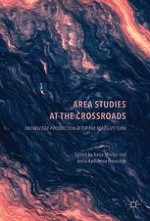
2017 | OriginalPaper | Buchkapitel
Introduction: Knowledge Production, Area Studies and the Mobility Turn
verfasst von : Katja Mielke, Anna-Katharina Hornidge
Erschienen in: Area Studies at the Crossroads
Verlag: Palgrave Macmillan US
Aktivieren Sie unsere intelligente Suche, um passende Fachinhalte oder Patente zu finden.
Wählen Sie Textabschnitte aus um mit Künstlicher Intelligenz passenden Patente zu finden. powered by
Markieren Sie Textabschnitte, um KI-gestützt weitere passende Inhalte zu finden. powered by